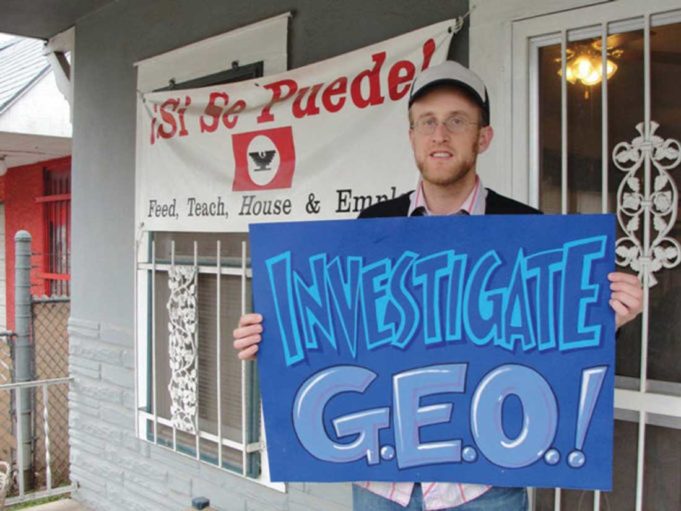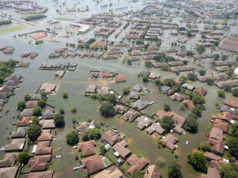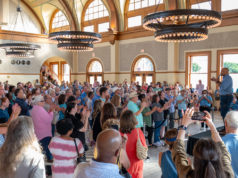Family detention facilities are not childcare centers. That was the decision handed down on Friday by State District Judge Karin Crump in a case brought by an anti-private prison group against the Texas Department of Family and Protective Services, as well as two private prison giants: GEO Group and CoreCivic (formerly, the Corrections Corporation of America).
The lawsuit by Grassroots Leadership sought to deny childcare licenses to GEO’s Karnes Family Residential Center and CoreCivic’s South Texas Family Residential Center in Dilley. Both Karnes and Dilley had sought the licenses after a ruling by U.S. District Court Judge Dolly Gee in July, 2015, that holding asylum-seeking women and their children in detention centers violated a 1997 ruling that required federal authorities to detain children in the least restrictive settings possible.
“Texas granted Karnes a childcare license a few months ago, but everyone knew this was not a childcare facility,” said Amy Fischer, policy director of RAICES, a nonprofit that offers legal advice to immigrant families. “And if anyone had any doubts about that, well, they certainly knew it when Karnes barred crayons a couple of months ago.”
The Dilley facility had never been granted a license; a third family detention center in Pennsylvania was granted a childcare license that has since been revoked. The Crump ruling invalidates the Karnes license.
All of the women and children being held at the detention centers are seeking asylum here in the United States. “These are not illegal immigrants,” Fischer said. “These are women with children who are fleeing horrendous conditions in their homelands who are legally seeking permanent asylum here.”
Katie Shepherd, a legal fellow at the American Immigration Council, said that the women and children are fleeing “gang violence in Central America. They’re fleeing horrific domestic violence. They’re fleeing drug war violence.”
Shepherd, who worked directly with thousands of women with children at the Dilley facility, said that she never met one who did not “believe, with good reason, that they would suffer harm if they were forced to return home.”
Immediately following the ruling, 460 women and children from Karnes and Dilley were released and sent by bus to the RAICES center in San Antonio. A press release from ICE, part of the Department of Homeland Security which contracts out the family detention centers, said that the release was a normal part of operations and not done as a result of Crump’s ruling.
“They can say what they want, but nobody knew about the release ahead of time,” said Dr. Luis Zayas, dean of the School of Social Work at the University of Texas at Austin and one of the people who testified in the case for Grassroots Leadership. “They just put these people on busses and sent them out to RAICES with no real warning.”
Fischer said that RAICES had never before had anything like 460 asylum seekers released in a weekend. “We’ve never had more than 613 women and children in a month, so for ICE to say this was normal operating procedure is categorically false.”
Unfortunately, despite the release of that many asylum seekers over the weekend, the Dilley facility is still holding 1,787 women and children, Karnes is still holding 606, and the Berks facility in Pennsylvania, a very small facility that holds a maximum of 100, is still holding 86, according to ICE spokesman Carl Rosnok.
Bob Libal, executive director of Grassroots Leadership, acknowledged that while the Crump ruling makes it clear that the family detention centers are operating illegally, “this will not close down these facilities immediately, but it is a victory for all of us who have been saying that adult prisons are not childcare facilities. And the ruling reiterates that these places are not only immoral, but they’re illegal as well.”
Fischer said the women who were released don’t really understand what’s going on. However, “they’re happy they are no longer being detained in a place with guards at the door. When they get here, the first thing we say is, ‘You’re safe now.’ ”
UT’s Zayas believes the state of Texas changed the rules to accommodate GEO and CoreCivic after the 2015 ruling by Judge Gee, allowing them to “be licensed as childcare centers despite gross violations of the rules of childcare. Those violations include children living in rooms with adults to whom they are not related, to children of the opposite sex who are not related living in rooms together above a certain age, that sort of thing. Texas simply waved those rules.”
Zayas, who is also a psychologist, said that tremendous harm is done when children are kept in detention centers, even if it’s just for a short period of time: “The damage is enormous. No matter how prettily you paint these places, children suffer deprivation and fear and will suffer long-term consequences at the hands of government. They’ve done nothing wrong, and yet they’re still in prison. And then they see their mothers abused verbally and sometimes physically by the guards, their mothers who are supposed to be their strength and to protect them. You can imagine how damaging it is to the children’s mental health to see their mothers abused and powerless.”
Instead of national security threats, asylum seekers — who are perfectly legal from the moment they request asylum until their final petition is accepted or rejected — should be set up in camps in a community-like setting: “If you told me you were going to set up temporary camps where the mothers would get legal help with their asylum cases and psychological help to deal with the trauma that brought them here to seek asylum, and if the children would get medical and psychological help in that community setting, and if you were only going to hold them for a couple of weeks while they got that help before releasing them into the community while they await their court dates, that might be one thing. Imprisoning them is an entirely different matter.”
While CoreCivic did not respond to a request for comment on Judge Crump’s decision, Pablo Paez, a spokesman for GEO Group, said that “Karnes has operated as a family residential center since August 2014 at ICE’s request and has always been in compliance with ICE’s family residential standards. … At this time we expect the Karnes Center to be unaffected and to continue to operate in compliance with ICE’s family residential standards.”
Fischer is not surprised by GEO’s stance: “ICE is acting like a rogue agency, dealing with families without any eye to state or federal law. And despite the fact that these facilities are unlicensed, we don’t anticipate any changes in their operation, because the federal government believes they have the right to hold women and children in unlicensed facilities for up to 20 days.”
According to Shepherd, if the federal government really wanted to do the right thing, they would “go back to their initial practice of releasing these women and their children to their loved ones while they pursue their asylum claims.”
Libal believes that “when you meet these folks, you instantly realize these are not national security threats. These are moms and kids fleeing horrible violence, and we throw them into detention, sometimes for months, and then still try to deport them. Back to what? More horrible violence? If anything, this decision should be an indication that President Obama should end these family detention centers once and for all.”












